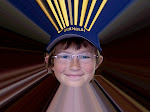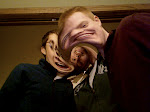I think the Bryan Alexander article, though densely written, did a terrific job defining Web 2.0 for a mainstream audience. His discussion and description of microcontent, folksonomies, RSS feeds, and ARGs (alternate reality games) was both informative and provocative.
He spent a considerable amount of time on social networking and the profusion of them on the Web. An interesting tangential article would discuss the popularity of these networks and the stratification of use by age, gender, and socio-economic status.
I am struck by the tempo of the technological change impacting the Web. The potential for astounding change and transformation is infinite. At the same time this potential for change is tempered by the dark side of possible societal and certainly educational consequences. It seems that educators and parents and kids should be having a conversation about how technology will impact student learning, how they process information, how they create meaning from that information, and how they critically assess information. Meanwhile the beat goes on and technology whether software or hardware continues to alter our society and schools on micro and macro levels. Sometimes I want to say slow down! I need a moment to catch up, reflect and engage with this new learning.
Thursday, October 25, 2007
Thursday, October 11, 2007
Is it really teaching if the students are 'aloud'?
The article by Sprague and Dede did a solid --though at times a bit hokey--job presenting the contrasts betwixt a Constructivist classroom and a more traditional classroom.
I was struck by the fictional principal feeling more secure and comfortable observing the teacher who had given the same lecture on the same day for nine consecutive years. I think this is the challenge of Constructivist Teaching and Learning. All educators' teaching methodologies reflect their own student-learning experiences which in turn are based on the styles of the teachers they had. So if a teacher had very traditional-quiet classroom experiences that will indeed be how their classroom will be conducted. On the other hand teachers who were able (as students) to be actively engaged in role playing, simulations or student created panel discussions (for a few examples) will in turn develop activities doing the same for their own students.
I think that teachers who are unable to let go of being the knowledge-boss AKA the font of most important stuff--will struggle with integrating technology into their classroom for several reasons. Once students are no longer locked into their desks or focused exclusively on the "front" of the room, they can go almost anywhere intellectually speaking. When students are allowed to process information with classmates and respond with a collaborative version of a reflection paper, a traditional teacher may feel unsure as to the ultimate destination of the discussion because they are unable to anticipate the myriad of questions or situations that may arise from the student group reflection! A teacher who has always managed a quiet very carefully structured classroom may develop small rashes or experience shortness of breath at this point!
I think that the Sprague & Dede article is effective in contrasting the two teacher styles and I purposefully did not highlight it as I want to make copies to share it with some colleagues for their own reflection and feedback. Then again I could pdf it and save the copies (!!).
I was struck by the fictional principal feeling more secure and comfortable observing the teacher who had given the same lecture on the same day for nine consecutive years. I think this is the challenge of Constructivist Teaching and Learning. All educators' teaching methodologies reflect their own student-learning experiences which in turn are based on the styles of the teachers they had. So if a teacher had very traditional-quiet classroom experiences that will indeed be how their classroom will be conducted. On the other hand teachers who were able (as students) to be actively engaged in role playing, simulations or student created panel discussions (for a few examples) will in turn develop activities doing the same for their own students.
I think that teachers who are unable to let go of being the knowledge-boss AKA the font of most important stuff--will struggle with integrating technology into their classroom for several reasons. Once students are no longer locked into their desks or focused exclusively on the "front" of the room, they can go almost anywhere intellectually speaking. When students are allowed to process information with classmates and respond with a collaborative version of a reflection paper, a traditional teacher may feel unsure as to the ultimate destination of the discussion because they are unable to anticipate the myriad of questions or situations that may arise from the student group reflection! A teacher who has always managed a quiet very carefully structured classroom may develop small rashes or experience shortness of breath at this point!
I think that the Sprague & Dede article is effective in contrasting the two teacher styles and I purposefully did not highlight it as I want to make copies to share it with some colleagues for their own reflection and feedback. Then again I could pdf it and save the copies (!!).
Wednesday, October 3, 2007
Chinese for Challenge?
I may be "misremembering" (to twist a term ala our Decider-in-Chief) yet when I contemplate the technology-education revolution I can't help but think about the Chinese script character that means both challenge and opportunity. (Or perhaps I've blurred a slogan from a motivational poster.) Regardless-- I am struck by the daunting nature of the challenges and opportunities that face individual educators. I'm opting to focus on individual educators since the institution of education is hard to fathom and ala the Pentagon not the most adaptable of creatures.
I've spent a bit of time "window-blogging"-- which is far less expensive and time consuming than mall crawling. I'm impressed and enthused with the quality of the edu-blogs that I've sampled and excited to delve further into the on-line activities and student examples that ed-bloggers have posted. Blogging has far more potential for teaching and learning on the secondary level than I initially gave it credit in my previous post. I'm resolutely re-evaluating my perspectives on ed-tech. change as they have been so shaped by my own educational journey that prior to 2006 was sans any hint of technology innovation or incorporation. While I've considered myself to be a creative, innovator in the chalkboard classroom, I'm realizing that I must sample other educators strategies to better understand how a 'nology could be incorporated into my history classroom or how it could broaden my teaching repertoire at the same time broadening participation venues for my students. Much less permitting my students to access experiences and perspectives previously unknown and untapped in my chalkboard classroom.
The more I explore and sample the blogging classrooms the more my Baby Boomer Brain can open itself to
taking "teaching techno-risks" and create relevant, compelling, and meaningful learning opportunities for my students!
The Chinese Challenge in the ed-tech revolution comes in the form of the sheer scope of the material and potential. My middle school niece working on a school project will suddenly have a list of published sources found at the local library jump from a decent 12-15 to hundreds maybe thousands of possible sources available on-line. This is where the crucial element of tech. literacy appears as a required learning standard for 21st century learners. Students must be savvy consumers of information as well as being able to critically evaluate information available via the W3.
The other Chinese Challenge involves the finite and unchanging 24 hour day. While educational technology does save time for teachers and students it can also be the equivalent of the La Brea Tar Pits in that a simple search can lead to multiple tangential forks in the cyber-way. Perhaps one of the National Educational Technology Standards needs to include recommending some sort of cyber chip implanted in any search engine that alerts the searcher to the number of minutes, sites, and links visited in their search so that a student or educator working under time constraints can better monitor their effectiveness and efficiency... Then again there probably is such a thing and this tech-novice is simply unaware of such! :-)
I've spent a bit of time "window-blogging"-- which is far less expensive and time consuming than mall crawling. I'm impressed and enthused with the quality of the edu-blogs that I've sampled and excited to delve further into the on-line activities and student examples that ed-bloggers have posted. Blogging has far more potential for teaching and learning on the secondary level than I initially gave it credit in my previous post. I'm resolutely re-evaluating my perspectives on ed-tech. change as they have been so shaped by my own educational journey that prior to 2006 was sans any hint of technology innovation or incorporation. While I've considered myself to be a creative, innovator in the chalkboard classroom, I'm realizing that I must sample other educators strategies to better understand how a 'nology could be incorporated into my history classroom or how it could broaden my teaching repertoire at the same time broadening participation venues for my students. Much less permitting my students to access experiences and perspectives previously unknown and untapped in my chalkboard classroom.
The more I explore and sample the blogging classrooms the more my Baby Boomer Brain can open itself to
taking "teaching techno-risks" and create relevant, compelling, and meaningful learning opportunities for my students!
The Chinese Challenge in the ed-tech revolution comes in the form of the sheer scope of the material and potential. My middle school niece working on a school project will suddenly have a list of published sources found at the local library jump from a decent 12-15 to hundreds maybe thousands of possible sources available on-line. This is where the crucial element of tech. literacy appears as a required learning standard for 21st century learners. Students must be savvy consumers of information as well as being able to critically evaluate information available via the W3.
The other Chinese Challenge involves the finite and unchanging 24 hour day. While educational technology does save time for teachers and students it can also be the equivalent of the La Brea Tar Pits in that a simple search can lead to multiple tangential forks in the cyber-way. Perhaps one of the National Educational Technology Standards needs to include recommending some sort of cyber chip implanted in any search engine that alerts the searcher to the number of minutes, sites, and links visited in their search so that a student or educator working under time constraints can better monitor their effectiveness and efficiency... Then again there probably is such a thing and this tech-novice is simply unaware of such! :-)
Subscribe to:
Posts (Atom)
iToons
London 2005
Enroute to the Tower of London



